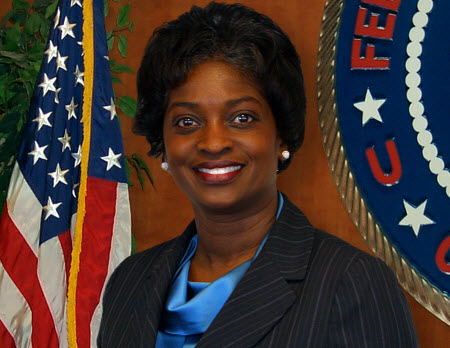Clyburn: FCC Will Look Into OTT Distribution Access
The smarter way to stay on top of the multichannel video marketplace. Sign up below.
You are now subscribed
Your newsletter sign-up was successful

FCC commissioner Mignon Clyburn said she expects the commission will soon launch a notice of inquiry (NOI) on access to over-the-top distribution channels by independent programmers.
An NOI is an investigation and might or might not result in any regulation.
That came at an FCC commissioners panel at the Multicultural Media, Telecom & Internet Council's annual Broadband and Social Justice Summit in Washington Thursday.
She said that while OTT offers a lot of promise and optimism on the surface, from those she has talked to, “the same old legacy issues” about getting projects greenlighted and access to distribution channels remain. She said she did not know whether it was an issue the FCC could solve, but it would be a platform for discussion and put attention on the issue.
She said her audience would hear about the NOI in the next few weeks.
In an impassioned speech to MMTC the day before, consultant and former top Clinton telecom adviser Larry Irving lamented the dearth of black or Latino producers in the new crop of online originals from Netflix.
Neither Republican commissioner Ajit Pai or Michael O'Rielly professed to know that an NOI was contemplated but said they would be interested in seeing it.
The smarter way to stay on top of the multichannel video marketplace. Sign up below.
Pai said the FCC didn't need to be in that space and that there were plenty of opportunities to get content on the Web and profit from it.
Clyburn said there was a difference between getting on the Web and making money. She said it was one thing to upload a video and another to make a living. She said there were a lot of Internet stars but asked how much they were "truly making."
"Are there bottlenecks or barriers to entry?," she asked. "These are some of the things that I hope we will talk about" in this inquiry, as well as who should address bottlenecks, "if anyone."
O'Rielly suggested that some YouTube stars were making a lot more than the commissioners on the panel. As to the legacy issues of access to distribution channels, O'Rielly said that YouTube in terms of getting programming out "completely eviscerates a number of the current models that have been so problematic in the past." He said it is no longer how some pilot can be greenlit on a broadcast station. Actually, it is networks that do that, but his point is that with the Web, he can do the pilot from a garage or basement and people can "see it and like it and I can make money out of advertising."
Pai said he was inspired by the people who were bypassing the legacy models to get their content online. He said he had been told by people "across the country" that her OTT proceeding "would be a terrible thing for minority programmers" because it would "lock us in with the big guys and establish legacy regulations over this really nascent space."
An FCC spokesperson would not confirm or deny the NOI, but pointed out that Clyburn had called for an NOI on barriers to diverse programming at the tiome of the FCC's approval of the AT&T/DirecTV deal.
Clyburn backed off a little bit, saying she was "hopeful" there would be an NOI, but appeared confident the NOI was coming.
FCC chairman Tom Wheeler has proposed defining some OTT providers as MVPDs so they will have access to programming, but the NOI would look at the other side of the equation, access by independent programmers to online distribution.
Contributing editor John Eggerton has been an editor and/or writer on media regulation, legislation and policy for over four decades, including covering the FCC, FTC, Congress, the major media trade associations, and the federal courts. In addition to Multichannel News and Broadcasting + Cable, his work has appeared in Radio World, TV Technology, TV Fax, This Week in Consumer Electronics, Variety and the Encyclopedia Britannica.

